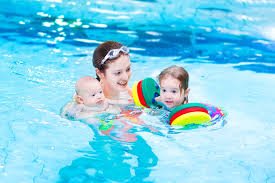Infants Swim Lessons: Building Water Confidence from the Start
Help your baby build water confidence early with fun, safe infants swim lessons! Boost development, safety skills & bonding. Enroll your infant today!

Introducing your baby to the water early in life can lead to a lifetime of water safety, enjoyment, and health. Infants swim lessons are designed specifically for children aged 6 months to 3 years. These lessons are not only about swimming skills but also about bonding, sensory development, and introducing your little one to a vital life skill in a safe, fun, and structured environment.
Why Start Swim Lessons Early?
Starting swim lessons in infancy offers a wide range of developmental benefits. Babies are naturally comfortable in water, especially in their first year, because it mimics the womb environment. Enrolling your child in infants swim lessons helps maintain this comfort and encourages early adaptation to aquatic environments.
Some of the top benefits include:
-
Water Safety Awareness: While babies won’t learn to swim independently right away, they will be introduced to important water safety concepts such as floating, breath control, and entering/exiting the pool safely.
-
Physical Development: Swimming strengthens your baby’s muscles and cardiovascular system. It supports better coordination, balance, and flexibility.
-
Cognitive and Sensory Growth: Babies learn through touch, movement, and interaction. The stimulation from water enhances their sensory experiences, supporting brain development.
-
Emotional Bonding: Infant swim classes are often parent-child sessions. These shared experiences strengthen emotional bonds and build trust.
What to Expect in an Infant Swim Lesson
Infants swim lessons are typically conducted in warm, shallow pools under the supervision of certified instructors. Sessions usually last 20 to 30 minutes to suit a baby’s attention span and energy levels.
Here’s what you can expect during a class:
-
Songs and Games: Instructors use familiar songs and gentle play to create a positive, fun environment.
-
Water Acclimation: Babies are slowly introduced to water, starting with getting their faces wet and learning to blow bubbles.
-
Basic Skills: Infants learn back floating with support, kicking, and safe water entries and exits.
-
Parent Participation: Most classes are designed for a parent or caregiver to be in the water with the baby to provide comfort and support.
Choosing the Right Infant Swim Program
Not all swim schools are the same. When selecting a program for your baby, consider the following factors:
-
Certified Instructors: Look for instructors who are certified in infant aquatic education and pediatric CPR.
-
Warm, Clean Pool Facilities: Babies are sensitive to cold water and harsh chemicals. Choose a facility that maintains proper temperature and hygiene.
-
Small Class Sizes: A lower instructor-to-baby ratio ensures your child gets the attention they need.
-
Positive Reviews: Check parent testimonials and online reviews to assess program reputation.
Safety First: Tips for Parents
Safety is paramount when it comes to infants swim lessons. Here are a few important tips:
-
Never leave your baby unattended near water, even shallow pools.
-
Use swim diapers to maintain hygiene in the pool.
-
Watch for signs of fatigue or discomfort during lessons and communicate with the instructor.
-
Don’t rush progress—every baby develops at their own pace. Consistency and patience are key.
When Is the Right Time to Start?
Most swim schools accept infants as young as 6 months. At this age, babies typically have enough neck and head control to participate safely. However, always consult your pediatrician before enrolling your baby in swim lessons, especially if your child has any medical conditions or developmental concerns.
How Often Should Infants Swim?
Weekly sessions are ideal to keep your baby familiar and comfortable in the water. Regular attendance helps with muscle memory and accelerates learning. Some programs offer twice-weekly sessions or intensive holiday courses for faster progress.
Common Questions About Infant Swimming
1. Will my baby learn to swim on their own?
Not immediately. Infants swim lessons focus on water confidence and safety, not independent swimming. However, they lay the groundwork for future swim skills.
2. What if my baby cries during lessons?
It’s normal for babies to feel uncertain at first. Stay calm, reassuring, and positive. Over time, most babies grow to love water activities.
3. Is it okay to start lessons after 1 year?
Yes! While earlier is often better for acclimatization, many babies start between 1 and 2 years old and still benefit greatly from swim lessons.
The Long-Term Benefits
Infants who participate in early swim lessons often develop advanced swimming skills faster than peers who start later. They also tend to be more confident in water settings, which reduces the risk of panic or unsafe behavior near water.
Moreover, the sense of independence and achievement they get from mastering new skills can positively affect other areas of life, such as social interactions, self-esteem, and cognitive performance.
What's Your Reaction?















.jpg)
.jpg)

